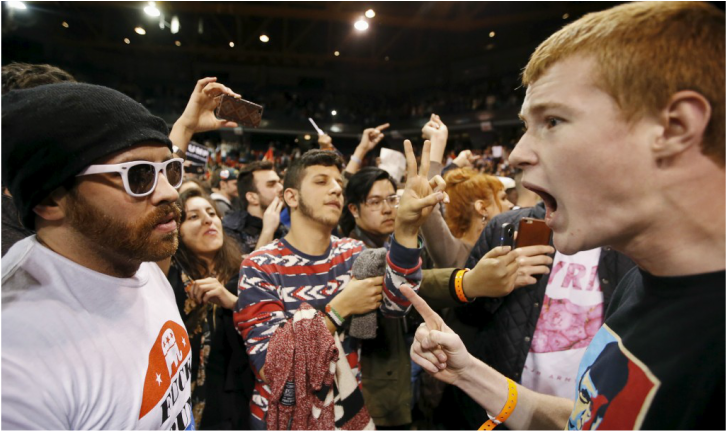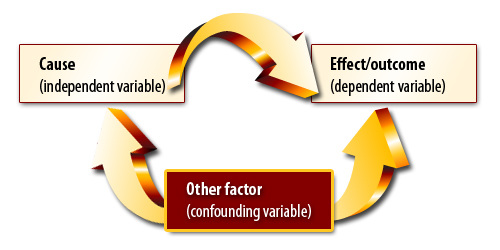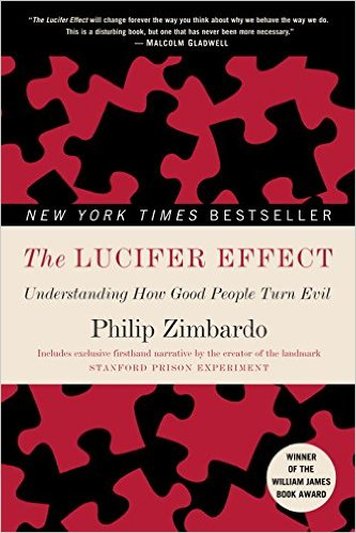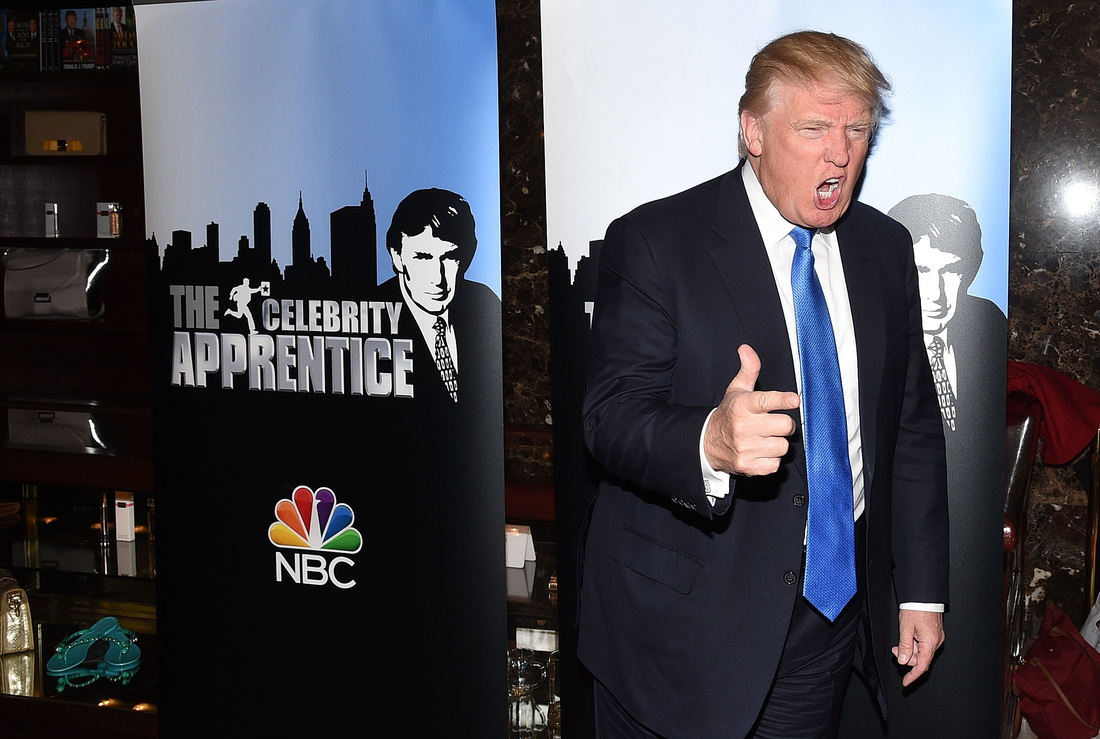|
Everyone is talking about how Donald Trump rallies are getting increasingly violent, and the cause of the violence is Donald Trump himself. While it's true that Trump's rhetoric is politically incorrect at best -- and he has arguably endorsed and encouraged violence -- I couldn't help but wonder: is Trump the cause? To answer that, let's take a small step back. Let's talk about a few basic rules for scientific thinking. For example -- accept reality, even if you don't like it or want to change it. Embrace logic. Avoid contradictions. And, importantly, correlation is not causation. What does that mean? Well, as I wrote in There is No Benefit to Having Self-Esteem, There is a correlational relationship between happiness and self-esteem, but, remember: correlation is not causation. We don't know if happy people have higher self-esteem, or if self-esteem makes people happier. Or maybe there is a third, confounding factor, such as success, that is related to happiness and to self-esteem, when happiness and self-esteem have no direct relationship. This is not to say that there is no value in correlations -- they can tell us something about trends and relationships, and we can use that information to further explore issues, and test and develop hypotheses. So let's apply this logic to Trump. ("Logic" and "Trump" in the same sentence... maybe we're starting off on the wrong foot.) Does Trump cause violence? Does violence cause Trump? Or might there be some confounding factor here that no one is talking about? Let's discuss. The case for Trump causing violence: I'll let Trump speak for himself on this one. Obviously this video is edited. Maybe there was context missing from some of his remarks and the subsequent events. We all know that videos can be misleading. Nevertheless, Trump was captured saying at least the following comments at his rallies:
As well as mean-spirited remarks like:
Fine. But are remarks like these enough to incite violence in a crowd? Maybe. According to psychology research, human behavior is almost entirely situational, not dispositional. Meaning that perfectly nice, normal people could do horrible things under the right (wrong) circumstances. Like Abu Ghraib. Pretty much everyone who knew the soldiers involved in Abu Ghraib expressed shock and disbelief -- "He was always such a sweet boy!" "He is the last person I would have expected to do something like that." Are they lying? Maybe. But much more likely, they are telling the truth. Perfectly good people were put into a bad situation: an overcrowded, understaffed prison where soldiers were stressed and sometimes fearful. Prisoners who were (perhaps inadvertently) dehumanized and deindividualized by being assigned numbers, wearing identical uniforms, etc. -- not to mention the overarching "they are the enemy" theme. Or the possibility that these soldiers knew someone who had been killed or harmed by said enemy. The guards themselves were deindividualized, to a degree, through assuming a military identity and uniforms. And there is a rigid power structure in the military -- obedience and compliance are drilled in. Questioning orders can even be illegal. All of this combined, we ended up with "sweet boys" who "would never do something like that" doing something like that. Don't smirk and think you're any better. You probably aren't. Psychologists have spent a lot of time studying good and evil, and a century of research supports that good people do bad things in bad situations. Recall Milgram's experiment, in which every single "good" person who participated in the study -- people like you! -- willingly administered dangerous 300-volt shocks to other study participants -- and 65% of "good" people continued administering 450-volt shocks to seemingly unconscious victims. Or Zimbardo's Prison Experiment, in which "good" people assumed the randomly-assigned roles of prisoners and guards. "Prisoners" quickly became meek and submissive, and "guards" correspondingly became sadistic and mean. (There's a cool new movie about this. Check out The Stanford Prison Experiment on Amazon.) While a Trump rally isn't an overcrowded prison, it does present some dangerous factors. First, huge gatherings of people often adopt mob mentalities -- it's easy to feel faceless (deidentified) in a crowd. People want to feel a sense of "belonging" to their group, and will often conform to explicit or perceived cultural norms. Protestors are very much the out-group in this scenario. Combine that with the fact that many of these Trump supporters drove or stood in line for several hours to attend the rally -- fatigue, hunger, impatience, frustration, disappointment and thirst can all contribute to negative social behaviors. Want an intimate understanding of evil? Add The Lucifer Effect: How Good People Turn Evil to your reading list. So yes, it's highly possible that Trump condoning or encouraging violence (even jokingly) contributes to actual violence. After all, he's not just some random guy telling you to punch someone. He's the man you think is going to be the next president of the United States. Talk about skewed power dynamics! For this argument to be true, though, you would have to expect certain aspects of this to carry over to other candidates' rallies. If Hillary Clinton and Bernie Sanders started saying things like, "I'd like to punch that guy in the face," do you think their supporters would become violent? If John Kasich told his supporters, "Knock that guy out," do you think they would? Don't answer too quickly, because this is a very difficult question -- and if you don't understand why, you may as well stop reading now. If you answered yes, you believe that Clinton, Sanders and Kasich supporters would become violent if their candidates used Trump-like rhetoric at their rallies. So let's reflect back on this scene, from Shouting Doesn't Take Courage - Listening Does: Many social justice types were offended that Hillary's crowd booed, hissed, and shouted, "You're being rude!" when Ashley Williams interrupted the speech. (Even though she was being rude.) Can you imagine this scene becoming violent, had Hillary said, "Someone knock her out -- I promise I'll pay your legal fees." Or what about this scene, when two girls interrupted a Bernie Sanders rally in Seattle, screaming, "If you do not give us the mic, your event will be shut down, RIGHT NOW." They continue by waving their hands in his face and violently shaking his podium. The crowd begins shouting, "Let Bernie speak! Let Bernie speak!" (Makes sense, right? People traveled and waited to see Bernie, not two random girls, speak. And one point that Trump has made that I thought was actually valid was, If Sanders can't stand up to two young girls at his rally, how is he going to stand up to China?) Had Bernie said, "These girls really need to go on a diet," or, "Get them out of here!"... do you think his progressive Seattle crowd would have turned violent? If so, you could reasonably argue that Trump is the cause of the violence. But in that case, shouldn't he also be able to end the violence? For example, by calling off the Chicago rally because of security concerns? Or perhaps by telling security guards and Trump supporters, "Don't hurt 'em, don't hurt 'em." Because that's what he's been doing since Saturday. If people are truly responding to his calls for violence, shouldn't they also listen to his calls against it? (Or perhaps it doesn't work that way.) But if you answered no, other candidates' supporters aren't prone to violence, then the claim that Trump causes violence is a contradiction. In which case, a more reasonable argument for you would be: The case for violence causing Trump. Even if you hate the man, I think we can all agree that Trump is a successful entertainer. I mean -- have you hosted 14 seasons of an NBC reality television program? Have you had between 4.7 and 20.7 million viewers watching you each week? Has anyone ever made a video game featuring you? He's definitely a better entertainer than businessman -- reality star Paris Hilton inherited less and made more money than Trump, whose life work has not even outperformed an index fund. As a successful entertainer, you must be able to build a following. This is something Trump has clearly done well. According to him, he has more people at his rallies and events than any of the other candidates by far -- in fact, he claims that is why there is more violence at his rallies than other candidates'. (More crowds = more perceived anonymity = more negative social behaviors.) But I have no idea if it's true or not, so I will leave it at that. Part of being an entertainer is captivating your audience. Indeed, as John Oliver said last week, "Trump is objectively funny." He made me laugh three times this morning, even though I was frustrated that he wasn't actually saying anything. Not to mention the spectacle of rolling up in front of a crowd of thousands (tens of thousands?) in your TRUMP 767, getting off the plane, and beginning your speech. For those who missed it, here it is -- different speech, same entrance. Fast forward to 27:38 to see it in its full glory: But just as important as being able to captivate and delight your followers... is to resonate with them. To make them feel connected with you. To make them feel like your causes and their causes are aligned. Perhaps, as an entertainer, Trump has developed a powerful ability to pick up on the frustrations and emotions of his fan base, and has crafted his message around that. Maybe "those people" would be prone to physical violence, whether he encouraged it or not. Maybe his rhetoric has no effect on his audience whatsoever. I don't think this is necessarily true, either. Let's go back to psychology research, which shows that bad behavior is more situational than dispositional. My guess is that most of these people are perfectly fine on their own -- after all, they're not shoving and sucker punching people at their local Starbucks or Piggly Wiggly. So Trump probably isn't using his language due to the actions of his supporters. So what's happening? I'm going to go with: The case for a confounding factor. There is clearly something happening that is more or less specific to Trump rallies. Either that, or the media is biased to the point of dishonesty and Twitter is censoring videos of physical confrontations at Clinton rallies. But I'm no conspiracy theorist, so let's just assume that there is more violence at Trump rallies than other candidates' rallies. We've already talked about the fact that Trump rallies (allegedly) attract much larger crowds -- in which case, there is a larger chance of some of the people being prone to violence, which is multiplied by psychological factors like fatigue and anonymity. What we didn't discuss is the fact that Trump rallies seem to attract more -- many, many more -- protestors than other candidates. If you have more people instigating disagreement, shouldn't you expect more physical confrontations? To quote a Facebook friend, "I got into a fight once during middle school. I kept stealing the lunch of a fat kid and handing it back to him. He lurched around the table and started punching me as hard as he could in the head, with the force of approximately two pillows. I just sat there laughing at him until we both got pulled to the principal's office, where I was ID'd as the instigator of the fight -- rightfully so. Just because you don't throw the first punch doesn't mean you didn't instigate violence." When you've got a group of people that is hot, tired, thirsty and frustrated -- a group of people who was excited to hear a message, so they set aside a day or a half day or a couple of hours to learn about or support a candidate -- and then you do things like stealing their signs and ripping them up; taunting them; disrupting the speaker they've been excited to see for weeks... you could be the one who is creating the relationship between Trump rallies and violence. I'm not saying protesting is bad. I'm not saying violence is good. I'm just talking about relationships. Does A cause B? Does B cause A? Or does A cause C, and C causes B? Now, remember that we are here to examine the facts. Really consider them -- even if you don't like them or they disagree with your opinion. I think a reasonable case could be made for A (Trump) causing C (protestors), and C causing B (violence) -- whether intentionally or unintentionally. If someone stole my sign and tore it up, I'd be pissed -- what right do they have to destroy my property? If someone approached me with the apparent aggression you can see in some of the protestors in this video, I would definitely go into self-defense mode. I can tell you from personal experience: I have been attacked before, and I swore to myself that I wouldn't ever let it happen again. I wouldn't let denial, disbelief or benefit of the doubt cause me to hesitate when I should be defending myself ever again. And let's not forget about incidents like this one: And this one: Or, perhaps, we should consider this account by writer Keith O'Brein: "They (Trump supporters) kept coming, surging forward. I got struck in the head with a thrown object, something hard, metal perhaps. Protesters, unaffiliated with the UIC movement, lashed out, pushing back, fighting in skirmishes with willing Trump participants, baiting the violence. And the UIC students, angry to the point of tears, had to be held back from making similar mistakes, until finally the protesters, facing the crowd, linked arms as they had planned, coming together in a circle." It is clear that Trump's supporters aren't the only ones who occasionally become violent. (And, for what it's worth, it is technically a federal offense, punishable by up to 10 years in prison to protest anywhere the Secret Service might be guarding someone -- including at a Trump rally. Combine this with the fact that Trump supporters feel their First Amendment rights are being violated by protesters.) So, in general, could it be said that protestors cause violence? Yes -- especially when extreme views are involved. To cite a recent example: Once again, this is an extreme example. It involves a hate group, and there is probably a representation bias on both sides. (But then again, Trump seems to attract a disproportionate number of extremists, and he attracts a disproportionate number of protesters.) Here is a more "typical" level of violence (shoving), caused by a "protestor" at a BLM rally. It's an imperfect example, since this "protestor" was not protesting by choice -- he simply wanted to get to work so he wouldn't get fired, so he could feed his six kids. So let's look at one more example. Here's a heckler at a Sanders rally. He begins shouting around 1:50, and is quickly escorted out. This all goes down without incident. One might argue that Sanders supporters are more "civilized" than Trump supporters. Or, one might argue that demeanor matters -- this guy looks like his team just scored a touchdown. He is smiling, cheering and holding his arms in the V-for-victory position. He looks jovial, not angry. And he definitely doesn't look like he is resisting or interested in any kind of physical confrontation. (Side note: a lot of Trump protestors are very angry, and they have a right to be. Trump has said some horrible things, and there is no real comparison I can make to another candidate. Threatening to take someone's money away isn't the same as threatening to send someone's family away.) Here's another possible confounder: Liberal progressives are increasingly characterized by victimhood culture, while conservatives are characterized by honor culture. Here's what I mean by that. Victimhood culture is a movement that, in the words of sociologists Bradley Campbell and Jason Manning, is "characterized by concern with status and sensitivity to slight combined with a heavy reliance on third parties. People are intolerant of insults, even if unintentional, and react by bringing them to the attention of authorities or to the public at large. Domination is the main form of deviance, and victimization a way of attracting sympathy, so rather than emphasize either their strength or inner worth, the aggrieved emphasize their oppression and social marginalization." Victimhood culture generally emerges in settings that lack the intimacy and cultural homogeneity that once characterized towns, colleges and suburbs, but in which organized authority and public opinion remain as powerful sanctions. In victimhood culture, complaint to third parties is how to handle conflict. Posting videos online. Forwarding emails. Writing blog posts. Rather than tolerate or negotiate, people increasingly demand help from others, and advertise their oppression as evidence that they deserve respect and assistance. It makes sense, right? Whether you attribute it to special snowflake culture/the self-esteem movement/helicopter parenting or increased diversity in American communities, there is a trend towards seeking sympathy and talking about oppression on the left. Meanwhile, conservatives tend towards a more traditional honor culture -- think Old West. Campbell and Manning wrote in Comparative Sociology, "Honorable people are sensitive to insult... But honor cultures value unilateral aggression and disparage appeals for help. Public complaints that advertise or even exaggerate one’s own victimization and need for sympathy would be anathema to a person of honor.” From the honor culture perspective, members of victimhood culture need to toughen up. To me, this generalization makes sense. Sanders supporters want to redistribute wealth and create fairness for everyone. Trump supporters want to "make America great again" -- meaning restore the middle class. It's funny, because that basically means the same thing. But the groups' methods are very different -- because their cultures are different. Sanders supporters and social justice types want to appeal to a third party (the government) to enforce fairness. Trump supporters believe in a meritocracy -- if we could just get our jobs back, we would be able to provide for our families ourselves, without the shame of relying on the government for help. After all, as Emma Lindsey recently wrote in Trump Supporters Aren't Stupid, "As we export manufacturing jobs internationally and as we streamline labor with technology, we start moving people to the sidelines. It’s not just that they have less money, it’s that their identity as providers is being threatened. This is why they are often so against welfare. Even if it would fix their financial situation, it would not fix their identity problems. It would hurt their dignity. While the working class is undoubtedly worried about the economy, we already know many will not vote in their economic best interests. They vote for the candidate who promises a return to dignity, and it’s not because they’re dumb. It’s because they care about their dignity more than they care about their finances." So what we have in this case is A (Trump) causes/attracts H (honor culture) and A causes C (protestors). H+C leads to B (violence). Also worth noting: a shouting match doesn't count as violence. *** So here's a summary: The violence that's happening at Trump rallies is more complicated than just, "Trump said violent things and now people are violent." The vast majority of people -- even Trump supporters! -- are good people, even if they behave badly in certain situations. Yes, there is a lot of racism and frustration in this country right now, but I think part of the problem is that we are oversimplifying problems and refusing to look at other perspectives. Issues are complicated. People are complicated. And to truly understand the violence we've been seeing the last few weeks, it is useful to set aside your emotions sometimes, and just think about the correlations and causes and solutions.
2 Comments
Hi! I just recently discovered your blog and can't stop reading! I absolutely love how you emphasize how important it is to make yourself happy in such a black and white world. As a high school student it inspires me to know that I can do what makes me happy even if it's not necessarily with the intent of putting it on a college application. I can't wait to read more! I'm working on a blog post about 10 of my favorite blogs and I was wondering if you would mind if I mentioned yours on there? It just really stuck with me and I would love for more people to feel that way too!
Reply
3/22/2016 11:34:39 pm
Thanks for the feedback -- I'd be honored to be included in your blog post! Send me a link! I'd love to check out your work :)
Reply
Leave a Reply. |
About the Author

Eva is a content specialist with a passion for play, travel... and a little bit of girl power. Read more >
Want to support The Happy Talent? CLICK HERE!
Or Find me on Patreon!
What's Popular on The Happy Talent:
Trending in Dating and Relationships:
What's Popular in Science: Playfulness and Leisure Skills:
Popular in Psychology and Social Skills:
Categories
All
|





























 RSS Feed
RSS Feed